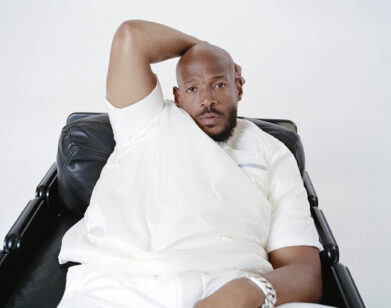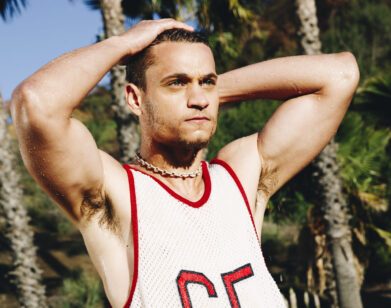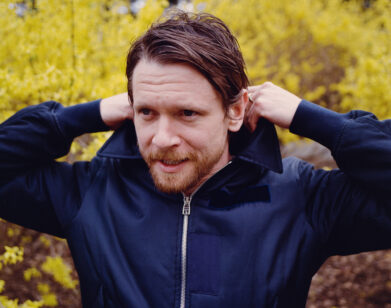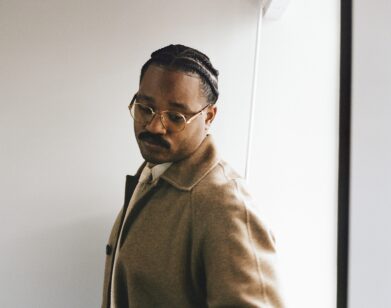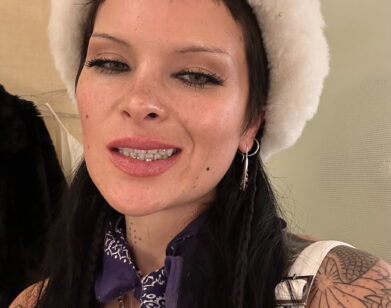rough draft
“I Think the Best Writing Destroys the World”: Da’Shaun L. Harrison Breaks Down Their Creative Practice

This is Rough Draft, in which our favorite writers get to the bottom of their own craft. From preferred writing drinks to whether or not you really need to carry a notebook, we find out all the ways they beat writer’s block and do the work. This week, we speak with Da’Shaun L. Harrison on the occasion of their new book Belly of the Beast: The Politics of Anti-Fatness as Anti-Blackness, an in-depth investigation of the connections between Blackness, fatness, and gender. Here, take a peek at their writing process and discover how they got it done.
———
JULIANA UKIOMOGBE: Describe your ideal writing atmosphere. What gets you in the mood?
DA’SHAUN L. HARRISON: I enjoy writing in quiet spaces. I get easily distracted, so being in spaces where music or funny videos are playing will quickly take me away from whatever it is I’m trying to write.
UKIOMOGBE: Do you eat or drink while you write?
HARRISON: I have to have a large thermos filled with cold water when I write. Typically, I don’t leave my seat without finishing whatever I sat down to write (not including book writing, of course), so I like to stay hydrated. I don’t typically have food while I’m writing, but on occasion, I definitely do bring a small snack for when I decide to take a light break or two.
UKIOMOGBE: Do you keep a notebook and/or journal?
HARRISON: I have always wanted to. Growing up, I would have my mom buy journals for me, and I’d write in them for a day or two and never pick them up again. As an adult, I have owned several journals but have never used them. I hear writers talk often about how much journals help them, but they’ve never really been useful for me. I have also never made an outline for my writing outside of when they were required for classes; perhaps those two things are related.
UKIOMOGBE: Do you prefer handwriting or typing?
HARRISON: I much prefer typing. I haven’t handwritten an essay in years. Being able to sit in front of my laptop or type up something on the Google Docs app on my phone is much more therapeutic for me. And easier, because I can do it anywhere.
UKIOMOGBE: What’s your favorite quote?
HARRISON: “If there is a book that you want to read, but it hasn’t been written yet, then you must write it.” — Toni Morrison. That quote is quite literally the reason I decided to write Belly of the Beast.
UKIOMOGBE: Whose writing do you always return to?
HARRISON: There are many writers who inspire me, whose work I return to when I feel I need a bit of help, but Dr. Daniel Black is at the top of that list. What he did with Perfect Peace epitomizes how I aspire to write: with much clarity, precision, conviction, demand, and in great detail. To me, he is one of the greatest writers to ever live.
UKIOMOGBE: What books did you read as a kid/teen? Have your thoughts about the writers changed?
HARRISON: I used to read and love the entire Harry Potter series. I still love the books, but for reasons I likely don’t have to explain, my feelings about J.K. Rowling have changed drastically.
UKIOMOGBE: Do you read while you’re in the process of writing?
HARRISON: Yes. Reading is research, and researching and writing go hand-in-hand for me. I can’t do one without the other.
UKIOMOGBE: Which writers inform your current work the most?
HARRISON: Sabrina Strings, Zakiyyah Iman Jackson, Kiese Laymon, Hortense Spillers, Saidiya Hartman, Joy James, Judith Butler, Michel Foucault, and Frantz Fanon. They, along with others, were vital to the writing of this book.
UKIOMOGBE: How many drafts of one piece do you typically write?
HARRISON: Only one. The draft is, of course, edited when necessary, but I only write one draft.
UKIOMOGBE: What would the title of your memoir be?
HARRISON: I can’t tell you that! It’ll ruin the reveal for when that memoir is eventually published. But stay tuned.
UKIOMOGBE: Who’s your favorite screenwriter?
HARRISON: Currently, it’s probably Jordan Peele or Ryan Coogler. I think they are both brilliant screenwriters, coming up with/further developing some really magnificent projects.
UKIOMOGBE: Do you consider writing to be a spiritual practice?
HARRISON: I’m sure it is for some. I don’t view it as such for myself.
UKIOMOGBE: Which writers would you choose to have dinner with, living or dead?
HARRISON: I would love to have one large dinner with Octavia Butler, Lucille Clifton, Kiese Laymon, Toni Morrison, Daniel Black, Hunter Shackelford, Alice Walker, Nikki Giovanni, June Jordan, and Danez Smith. I am in love with the way they use, manipulate, and bend language. I think that dinner conversation would be so much more than brilliant.
UKIOMOGBE: What advice do you have for people who want to be better writers?
HARRISON: I think my greatest advice is to not take advice from other writers. We are all so different in how we approach our art, and it’s important to check in with oneself about what feels most affirming for you to create the best environment to write in. I think we can offer help to those who ask for it, but unsolicited advice based on our own experiences can be more hurtful than helpful for new writers.
UKIOMOGBE: What are some unconventional techniques you stand by?
HARRISON: A lot of writers will tell you to write all your thoughts out uninterrupted and edit them after it’s all out; that is a big no for me. I can’t finish my work if I feel like something I wrote earlier on isn’t complete.
UKIOMOGBE: Can great writing save the world?
HARRISON: I think the best writing destroys the world.


